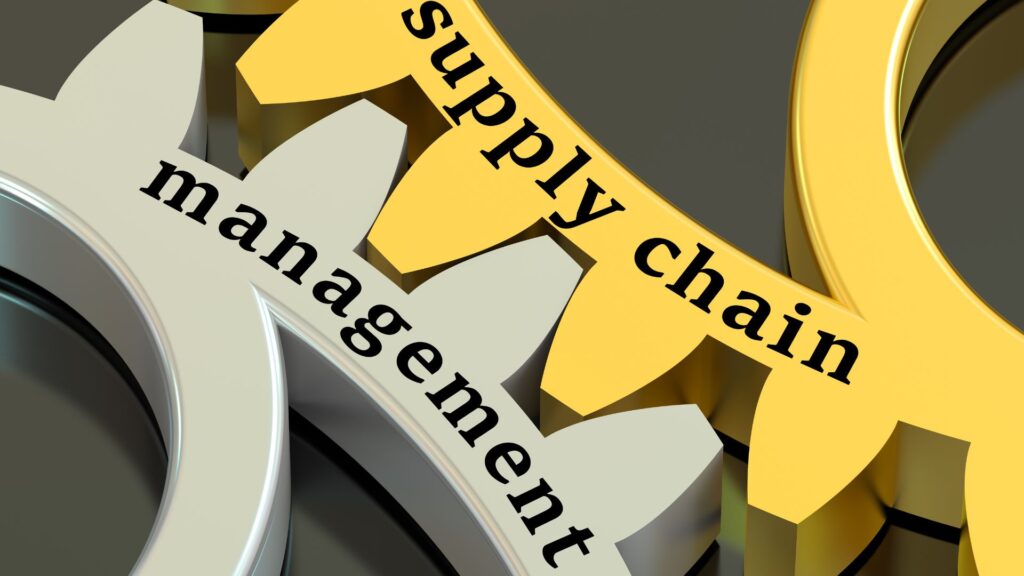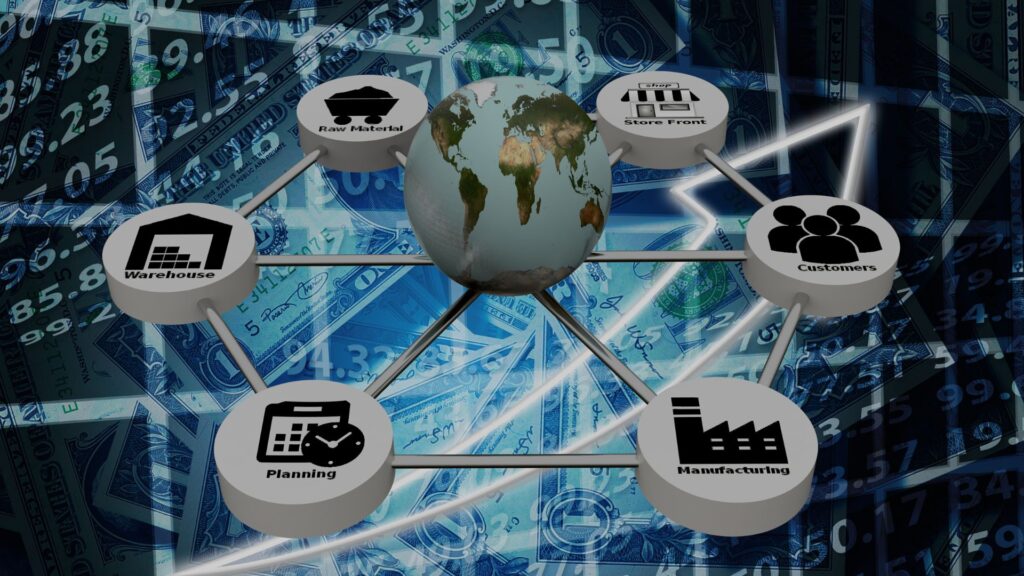Table of contents:
Blockchain consulting is rapidly transforming the business world, and supply chain management is doing wonders as well. With its ability to track business processes, secure transactions, and create transparent networks, blockchain will redefine the way we manage supply chains.
Hence, this requires a huge amount of finance and energy. According to a recent research report by MRFR, blockchain’s value in supply chain management is expected to reach $3.15 billion by 2028, growing at a CAGR of 51.3%.
Supply chain management has become increasingly complex in recent years due to globalization and technological advancements. Companies can now operate globally, collaborating with suppliers and partners worldwide. While this has brought efficiency gains and cost savings, it also presents new challenges, including increased complexity, risk, and the need for greater visibility and control.
This article explores the potential of blockchain technology to enhance transparency, traceability, and efficiency in supply chain management. We will examine various use cases and applications for blockchain in supply chain management. Additionally, we’ll look at challenges and limitations and discuss how blockchain is likely to revolutionize supply chain data in the years to come.
What is Blockchain in the Supply Chain
Blockchain technology is a digital ledger that is decentralized and securely keeps track of transactions. It was introduced in 2008 as the foundation of Bitcoin, and it has since expanded to various applications.
The blockchain consists of linked blocks, each containing verified transactions. Blocks cannot be removed or changed once they are introduced. Some of the key features include decentralization, which allows multiple parties to participate and verify transactions, and security, which is ensured through cryptography. This makes data tampering virtually impossible.
Blockchain has different types, and they include public, private, and consortium blockchains, each with different access permissions. The technology provides a secure, transparent, and intermediary-free way to record transactions, making it ideal for supply chain management, where trust and transparency between parties are essential.
Blockchain Use Cases in Supply Chain Management
Blockchain app development services can enhance the supply chain with some of the key use cases of blockchain. They include:
1#Traceability
Traceability is one of blockchain’s most captivating use cases in supply chain management. Blockchain enables businesses to create an indelible record of every product’s lifecycle, from sourcing to delivery. With its transparent and secure tracking, companies can accurately trace the movement of goods and ensure authenticity.
This heightened traceability promotes accountability, streamlines product recalls, and guarantees quality control. Moreover, consumers gain valuable insights into the provenance of their purchases, building trust and loyalty with brands.
2#Transparency
Blockchain technology enhances supply chain management by promoting transparency and trust. While traditional supply chains lack visibility, blockchain provides a decentralized ledger that is accessible to all stakeholders. This ledger records transactions transparently, thereby creating a single and immutable source of truth. Real-time tracking of goods from raw materials to end products enables businesses to identify inefficiencies and areas for improvement.
Additionally, blockchain captures and publicly discloses key data points, such as certifications and claims, building trust and ensuring authenticity verifiable by third-party attestors.
3#Inventory Management
Blockchain technology transforms inventory management in supply chain management by providing a secure, transparent, and real-time ledger. It tracks inventory movement and status across multiple facilities and locations, enabling stakeholders to monitor levels, locations, and conditions accurately. Subsequently, optimizing supply chain operations reduces the risk of overstocking or stockouts and ensures timely replenishment.
Blockchain’s ability to interact with off-chain data sources through oracles and IoT devices further enhances its effectiveness. By addressing traditional inventory management’s inefficiencies, inaccuracies, and lack of visibility, blockchain technology streamlines inventory control and fosters a more efficient supply chain.
4#Smart Contracts
Smart contracts are a game-changer for supply chain management using blockchain technology. This can automate payments based on predefined conditions, such as delivery confirmation or quality inspection.
These automated agreements make business processes easier and more efficient. They can cut out middlemen, reduce administrative costs, and minimize errors and disputes.
For example, smart contracts can automatically pay suppliers when goods arrive, ensuring a smooth and trustworthy process. This innovation makes supply chain management more transparent and reliable.
5# Compliance
Blockchain, in this regard, helps businesses adhere to rules and regulations in the supply chain. This is possible because the blockchain provides an auditable record of all transactions and activities throughout the supply chain.
Blockchain securely stores and shares documents like certificates of origin and quality inspections. Also, it facilitates the automation of compliance processes via smart contracts, which ensures all parties follow the set rules and regulations. By using blockchain, businesses can reduce risks, improve regulatory reporting, and build trust with stakeholders.
6# Quality Assurance
Blockchain technology enables quality assurance by tracking products throughout the supply chain, ensuring they meet specific standards. By recording data at each production stage, blockchain consulting companies can verify compliance with requirements, guaranteeing product quality and integrity.
Blockchain Industry Applications
Blockchain technology is extensively utilized across various industries to improve supply chain operations by enhancing transparency, visibility, compliance, and collaboration.
Below, we delve into prominent industrial applications of blockchain in supply chain management.
Food and Agriculture
In the food and agriculture sectors, blockchain technology addresses key challenges such as food safety, traceability, and transparency. By recording each step of the process from farm to table on an unalterable ledger, blockchain ensures consumers have access to accurate information about the origins of their food. This capability aids in quickly and accurately identifying food sources and promotes responsible farming practices.
Additionally, blockchain can monitor and track the conditions under which food is produced, transported, and stored, ensuring regulatory compliance and promoting sustainable practices.
Healthcare
The healthcare sector has adopted blockchain technology to tackle issues such as data integrity, patient privacy, and drug traceability. By utilizing blockchain, healthcare organizations can track the movement of pharmaceuticals, medical devices, and supplies from manufacturers to patients, ensuring authenticity and preventing counterfeit products. This also facilitates quicker tracking of medicines during recalls.
Retail
Blockchain technology has notably influenced the retail industry by addressing problems like counterfeit products, supply chain inefficiencies, and consumer trust. Besides offering advanced traceability, blockchain enables efficient inventory management by providing real-time visibility into stock levels, allowing retailers to optimize replenishment and minimize stockouts. This tracking also ensures these products are safe and uncontaminated.
Automotive
Blockchain simplifies the intricate web of manufacturers, distributors, and suppliers in the automobile sector, cutting down on paperwork and administrative effort. Smart contracts automate various processes in terms of payments and compliance checks, which foster collaboration and efficiency across the automotive supply chain.
Moreover, automotive manufacturers can use blockchain to trace the entire lifecycle of a vehicle, from sourcing raw materials to the assembly process and delivery to the end customer. This tracking ensures the cobalt is responsibly mined and does not originate from conflict zones.
Advantages of Blockchain Consulting in Supply Chain Management
Businesses can leverage blockchain technology to achieve significant benefits in supply chain management. The benefits include:
Increased Efficiency
They help to streamline operations, eliminate intermediaries, and automate processes with smart contracts.
Reduced Risk
Blockchain helps in tracking and verifying transactions, identifying potential risks, and preventing fraud with a secure and decentralized ledger.
Enhanced Trust
Blockchain builds trust in supply chains with multiple stakeholders by establishing a shared verifiable record of transactions, which reduces inefficiency and potential fraud.
Improved Collaboration
Blockchain provides a shared ledger that records and verifies transactions in real time, enabling secure and transparent data sharing. This enables better coordination and communication among participants.
By harnessing its benefits, blockchain app development service companies can transform their supply chain operations, improve efficiency, reduce risks, and build trust among stakeholders.
Limitations of Blockchain in Supply Chain Management
While blockchain technology offers numerous benefits, it also has several challenges and limitations:
Integration with Existing Systems
It has complex and time-consuming processes that require significant resources.
Cybersecurity and Data Privacy Concerns
Blockchain has vulnerabilities that can be exploited to compromise data and networks. Encryption, firewalls, and identity verification are essential.
Scalability Issues
Current infrastructure may struggle with large transaction volumes, which leads to delays and performance issues.
Legal and Regulatory Uncertainty
Unclear regulations in various jurisdictions create legal and regulatory risks.
Cost Considerations
Developing and maintaining a blockchain network can be costly with limited developer availability.
Despite these challenges, blockchain technology has the potential to transform supply chain management. To overcome these challenges, blockchain consulting companies should prioritize collaboration among stakeholders, develop industry standards for blockchain integration, and invest in robust cybersecurity measures.
How We Can Help
Imagine a world where supply chain tracking is seamless, transparent, and ethical. At North South Tech, we leverage blockchain technology to make this a reality, reducing risks, delays, and inefficiencies in your supply chain. Our blockchain consulting services provide the visibility and proof of compliance needed to build trust with customers and regulators. As the global economy evolves, our blockchain solutions offer a promising answer to supply chain challenges, paving the way for a more transparent, trustworthy, and efficient future. Ready to transform your supply chain? Contact us today to learn more.




